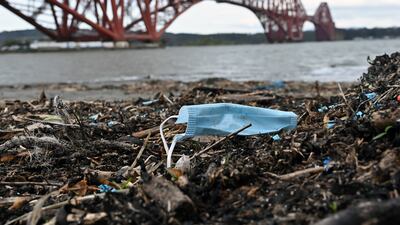Face-mask litter has increased significantly during the Covid-19 pandemic, creating a plastic pollution time bomb that could last for hundreds of years, researchers say.
Carelessly discarded masks can cause dangers to animals similar to the plastic pollution that sparked a "war on plastic" in places as far afield as the US, UK and Australia.
Single-use plastic and microplastics were prime targets of the campaign to reduce plastic. Now face masks are creating similar problems and potential for harming animals.
Researchers at the University of Portsmouth said that face masks can also act as a vector to spread Covid-19 and cause infrastructure problems, such as blocking sewers.
“Despite millions of people being told to use face masks, little guidance was given on how to dispose of them or recycle them safely. Without better disposal practices, an environmental disaster is looming,” the university’s Prof Steve Fletcher said.
“The majority of masks are manufactured from long-lasting plastic materials, and if discarded can persist in the environment for decades to hundreds of years. This means they can have a number of impacts on the environment and people."
There was a 9,000 per cent increase in litter from face masks recorded in the first seven months of the pandemic, according to the Portsmouth study.
Researchers urged the UK government to introduce legislation to prevent personal protective equipment becoming a littering hazard. Their work found two million items were collected in 11 countries.
“We found that littered masks had an exponential increase from March 2020, resulting in an 84-fold increase by October 2020,” lead researcher Dr Keiron Roberts said.
“There is a clear need to ensure that requiring the use of these items is accompanied with education campaigns to limit their release into the environment.”
Face masks also pose a threat to animals because they can choke on them or suffer problems if the masks are eaten. They can also damage plant life.
As well as the short and medium-term effects on spreading Covid, damaging infrastructure, animals who eat the waste, there is a long-term problem that dropped face masks can help transmit pollutants as well as become micro plastics that enter the food chain.
On Wednesday, UK Prime Minister Boris Johnson imposed his Plan B set of coronavirus restrictions, saying they are necessary to curb the spread of the Omicron variant. The new rules include wearing face masks in cinemas and theatres, work-from-home orders and vaccine passports to enter nightclubs.
Guidance to work from home will be reintroduced in England as part of measures to halt the spread of the Omicron variant, Mr Johnson said.
From Monday, December 13, everyone who can work from home has been advised to do so. The prime minister has given employers the rest of this week to discuss the new measures with staff.
From Friday, December 10, face masks will be reintroduced to most indoor venues, including theatres and cinemas. Mr Johnson said the mask guidance would include exemptions for when eating, drinking, exercising or singing.
The NHS Covid pass is to be made mandatory in England in a week’s time for nightclubs and venues where large crowds gather, Mr Johnson said.
The Covid health certificate will apply to unseated indoor venues with more than 500 attendees, and outside where there are more than 4,000 people.


